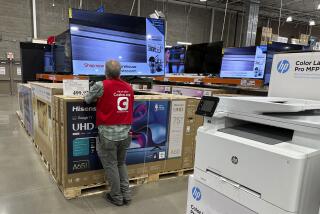China’s inflation surges on food, fuel
China’s inflation accelerated to the fastest pace in 11 years in February as food and energy prices jumped, increasing the likelihood the central bank will raise interest rates.
Consumer prices climbed 8.7% from a year earlier after gaining 7.1% in January, the statistics bureau said today. That was faster than the 7.9% median forecast of 22 economists surveyed by Bloomberg News.
Dousing inflation is the government’s top priority, Premier Wen Jiabao told China’s legislature last week after the worst blizzards in half a century exacerbated price gains. Six interest rate increases last year and the highest reserve requirements ever for banks have failed to tame inflation mainly driven by soaring food costs.
“They must raise interest rates big-time -- at least 2 to 3 percentage points this year,” said Andy Xie, an independent economist based in Shanghai.
The key one-year lending rate is 7.47%. The deposit rate is 4.14%, half the pace of inflation.
Inflation has surged since last March on costs of staple foods such as pork and cooking oil. China’s worst blizzards in half a century pushed up food and fuel prices because transportation bottlenecks disrupted supplies.
China’s leaders may raise rates this week to signal their determination to fight inflation as legislators gather at the annual meeting of the National People’s Congress, said Ha Jiming, chief economist at China International Capital Corp. in Beijing.
More to Read
Sign up for Essential California
The most important California stories and recommendations in your inbox every morning.
You may occasionally receive promotional content from the Los Angeles Times.









